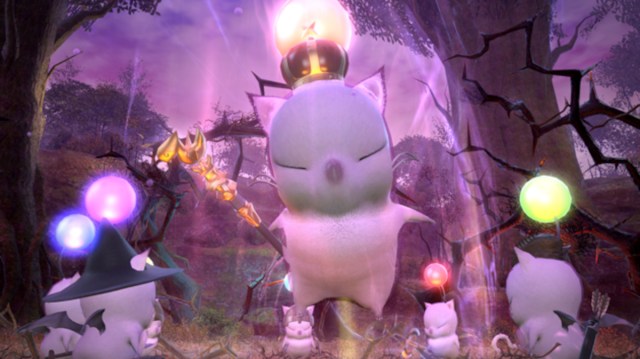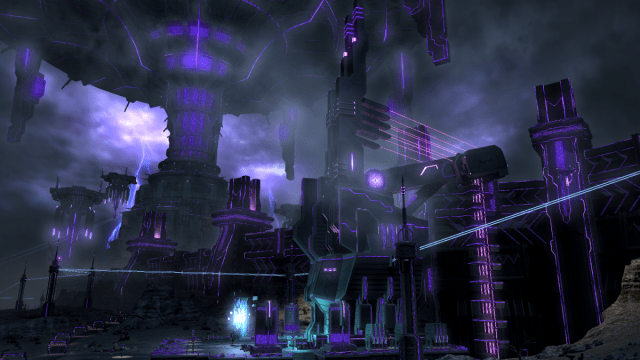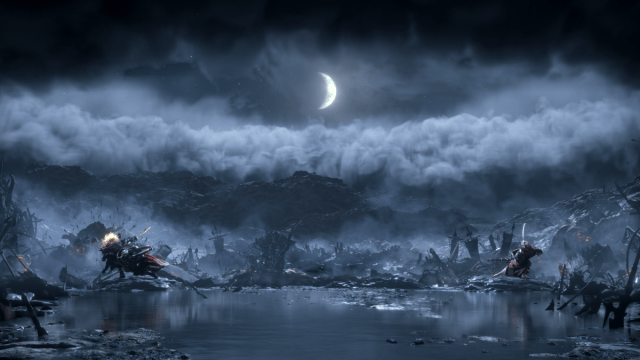Final Fantasy XIV has extensive amounts of lore, and none is more potentially confusing than the stories behind the Umbral Calamities. These Calamities have changed the world, brought worlds colliding together, and left legacies in their wake.
There have thus far been eight Umbral Calamities, most of which seem to center around a particular element. Some are definitely more well known than others, but all of them should be remembered.
The First Umbral Calamity

The First Umbral Calamity is what marked the beginning of what we now know as The Source. It’s also known as the Calamity of Wind, and much of what we know about it comes from the Moogles. In the tale of Good King Moogle Mog XII, we learn about a time when the Moogles filled the skies before it became the battleground of a war between the gods.
The Second Umbral Calamity

The Second Umbral Calamity was caused by kingdoms on The Source battling over territories. Also known as the Calamity of Lightning, this one was mostly caused by mankind’s own greed, but that didn’t make it any less devastating.
After the wars between kingdoms destroyed the nature of the land around them, volcanoes began to erupt, causing long-lasting darkness to engulf the world. In this darkness, a huge lightning storm began and lasted for a year and a day, sending the people into underground caverns in search of safety. While down there, they began praying for salvation and these prayers are said to be the first form of magical incantations.
The Third Umbral Calamity

Also known as the Calamity of Fire, the Third Umbral Calamity was a result of a massive shift to religion after the discovery of magic and the downfall of many of the world’s kingdoms. Corrupt and powerful, the Churches led the people into holy wars, witch hunts, and eventual genocide.
Tired of the wills of man, the gods are said to have punished the people. The sun became enlarged, and the earth became scorched and arid, leading people into famine. This Umbral Calamity is thought to be why Thanalan is now a desert, with discovered fossils leading many to believe that it was once lush and filled with greenery.
The Fourth Umbral Calamity

As we reach the Fourth Umbral Calamity, the stories may start to become more familiar. Also known as the Calamity of Earth, the Fourth Calamity occurred when Amon, then a scientist, attempted to revitalize his nation by bringing the first Allagan Emperor, Xande, back to life.
Forging a pact with the Cloud of Darkness to open a portal to The Void, Xande imprisoned the primal Bahamut within an artificial satellite which became known as Dalamud. The plan was to funnel Bahamut’s Aether into the Crystal Tower, but the ground below it collapsed under the force. This, in turn, led to massive earthquakes and even the crumbling of mountains.
The Crystal Tower was swallowed by the earth beneath it, encasing Xande inside.
The Fifth Umbral Calamity

The Fiffth Umbral Calamity is perhaps the most mysterious of all the Calamities. Little is known about what caused it. Otherwise known as the Calamity of Ice, the Fifth Calamity began with the Age of Endless Frost.
Eventually, this Endless Frost froze over the seas and Mi’qote tribes began to migrate en masse. The Lalafells who resided on Aloalo Island used the artifact we now know as the Key to escape into an unknown reflection, becoming known as the Milalla.
The Sixth Umbral Calamity

Bringing an end to the War of the Magi, which had been ongoing for more than 250 years, the Sixth Umbral Calamity is also known as the Calamity of Water. A devastating flood, thought to be caused by the overuse of the land’s aether, swept over Eorzea and destroyed both the cities of Nym and Mhach.
While the people of these cities fled to higher ground, magi from both Amdapor and Mhach worked together to find a new type of magic which would not drain aether from the world, giving birth to Red Magic. This seemed to quell the destruction, bringing the Sixth Umbral Calamity to its end.
The Seventh Umbral Calamity
The Seventh Umbral Calamity is perhaps the most well known to anyone who plays Final Fantasy XIV, as it was the end of FFXIV 1.0 and the start of A Realm Reborn.
Due to the fact that the previous Calamities had corresponding elements, the people of The Source thought that the worst was behind them. But then the Garleans, hungry for conquest, sought to use Dalamud to cause massive destruction in Eorzea.
In their attempts to gain territory, they dragged Dalamud out of the sky, not knowing that it was actually a Satellite encasing Bahamut. As Dalamud neared the surface, Bahamut erupted from his imprisonment and caused massive devastation, particularly on the Carteneau Flats.
Louisoix Leveilleur, grandfather to both Alisaie and Alphinaud, worked together with the Circle of Knowing in an attempt to protect what was left of Eorzea and its people. As they prayed to the symbols of the Twelve, Louisoix transformed into the Phoenix, spearing through Bahamuts chest. Dying, Bahamut dragged Louisoix down into the earth with him and tempered him to his will.
The Circle of Knowing survived, and went on to become the Scions of the Seventh Dawn.
The Eighth Umbral Calamity

The Eighth Umbral Calamity happened only in the alternative timeline during the early Seventh Astral Era (after the Sixth Umbral Calamity). Garlean forces unleashed a deadly gas called Black Rose against the people or Eorzea. This gas had the correct aspect to feed from the light-aspected aether of The First, which was swept into The Source and Rejoined.
The Eighth Umbral Calamity not only destroyed everything in Eorzea, but also the Garlean Empire as well. Survivors, including Cid Garlond, went on to figure out a method of returning to The First before it was rejoined. This research was eventually passed down, allowing for the re-awakening of G’raha Tia in the Crystal Tower 200 years after the Calamity.
Unfortunately, due to time flowing differently on The First, G’raha arrived 100 years ahead of schedule and had to hide behind the identity of the Crystal Exarch, awaiting the right time for the Warrior of Light to arrive in The First and quell the effects of Black Rose.





Published: Aug 25, 2024 12:31 pm